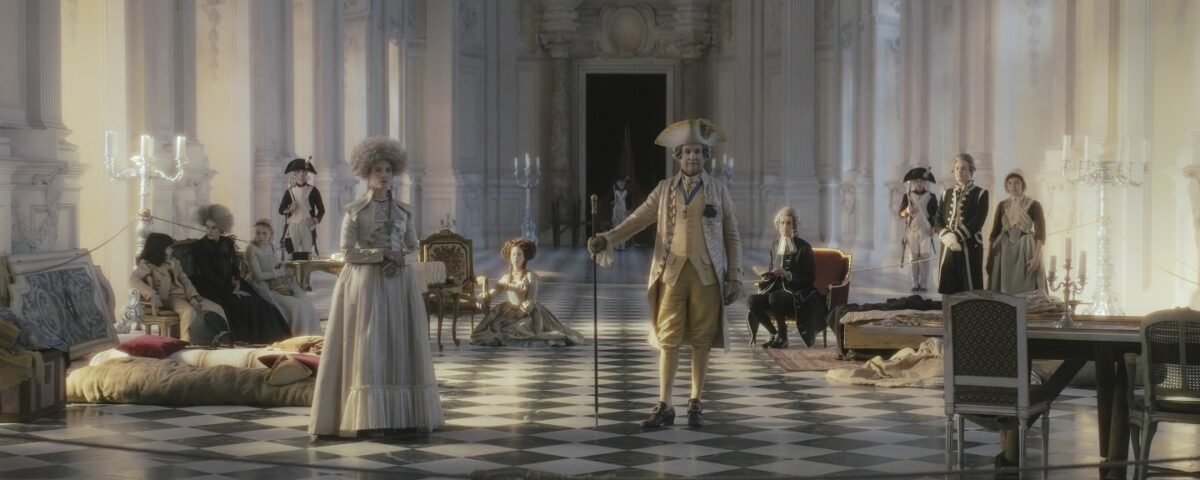


‘The Supremes at Earl’s All-You-Can-Eat’ Review: Aunjanue Ellis-Taylor, Uzo Aduba and Sanaa Lathan Buoy Routine Female-Friendship Drama
August 11, 2024


‘Mexico 86’ Review: Bérénice Béjo Toplines a Compelling Political Drama That Never Drums Up Enough Emotion
August 12, 2024Guillaume Canet and Mélanie Laurent star as Louis XVI and Marie-Antoinette in Italian director Gianluca Jodice’s latest feature, opening the Locarno Film Festival.
The Flood
Heads will roll.
The famous French saying, “Après moi, le déluge” (“After me, the flood”) has often been attributed to Louis XV, who used it to express his total disinterest in what would happen to the world after his own demise. If things fell apart, well, too bad. And yet it’s the king’s own grandson, Louis XVI, who was ousted from power during the French Revolution and died on the guillotine, to whom the quote is most applicable. His death, as well as that of his wife, Marie-Antoinette, marked the end of the monarchy and the height of the Reign of Terror. It was also the start of one of the first modern democracies, with all its grandeurs and flaws.
In this retelling, the two have already hit rock bottom and are left to deal with the consequences, sequestered along with their children and a few loyal servants in the Temple Prison, a dingy fortress located in the center of Paris. Forced to contend with their troubled marriage, their loss of immense wealth and the end of nearly 1,000 years of monarchal reign, the couple nonetheless tries to make the most of it. Surprisingly, they wind up becoming more vulnerable and human, and even admirable, in ways that weren’t previously possible. Perhaps the Revolution wasn’t such a bad thing for them after all.
Louis (Guillaume Canet) starts off as a befuddled ruler who seems to be in well over his head. But he ends up a knowing and loving patriarch, capable of dying with dignity. Marie-Antoinette (Mélanie Laurent) is a mercurial royal pain only interested in the fate of her latest lover. But by the time her husband is marched off to be guillotined at the Place de la Concorde before hundreds of people, she’s shown to be both sympathetic and fiercely committed to her family.
Whether or not any of this is true is uncertain, and The Flood feels more like speculative fiction than historical record. (Per the opening credits, the story was inspired by the journal of Louis’ personal valet, Jean-Baptiste Cléry, played here by Italian actor Fabrizio Rongione.) The film also feels, at times, like an apology for the French monarchy, depicting the king and queen as innocent victims instead of as the careless and often merciless rulers they were.
Meanwhile, the revolutionaries are mostly portrayed as bloodthirsty scoundrels trying their best to humiliate the royals in any way possible — including one sequence where a malicious prison guard (Hugo Dillon) coerces Marie-Antoinette into a sexual relationship, offering her certain privileges in exchange.
As in most screen depictions, Louis initially comes across as a droopy sad sack with little connection to reality, ignoring the empire crumbling at his feet while hoping God will swoop down and make everything alright. But Canet, who’s hardly recognizable beneath all the layers of prosthetics, also reveals another side to the ruler, showing him to be more deft than we imagined. He seems keenly aware of his wife’s many infidelities, accepting them as par for the course in a royal marriage. And when he learns of his death sentence at the hands of the républicains, he takes it with considerable grace, doing his best to ease the blow on his family.
With the exception, perhaps, of Kirsten Dunst’s ethereal portrayal in the Coppola movie, Marie-Antoinette has never been a very likable character in popular culture. Even in the opening ceremony of this year’s Paris Olympics, the queen was shown singing rock opera while gleefully holding her own decapitated head in her hands.
But Laurent manages to give her depth and compassion, depicting Marie-Antoinette as a woman intelligent enough to overlook Louis’ flaws and hypocrisies in order to maintain appearances. (“My husband is an honest man,” she tells a confidant early on. “His only fault is that he’s king.”)





